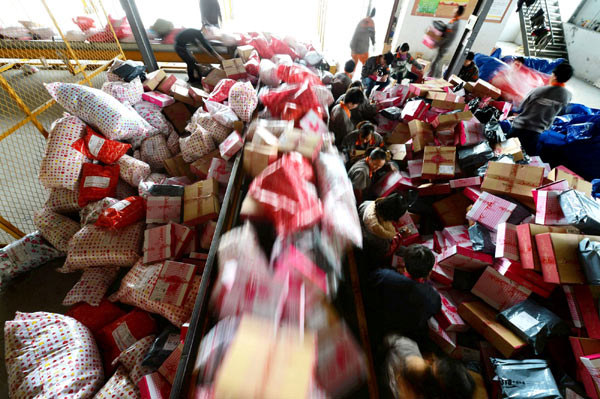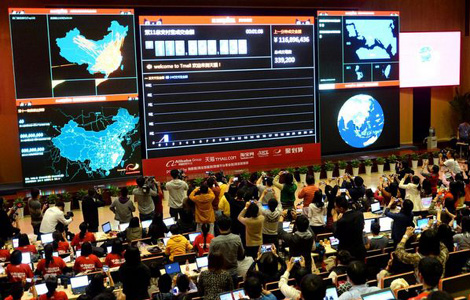Online shopping gala sets records
Updated: 2013-11-12 00:47
By HE WEI in Shanghai (China Daily)
|
||||||||
Mobile Internet, social media help boost transactions
|
 |
|
Goods for delivery pile up at a distribution center for courier company Shentong Express in Yangzhou, Jiangsu province, on Monday. Meng Delong / China Daily |
China's major e-commerce providers have posted record sales from the Nov 11 "Singles' Day" 24-hour online shopping blowout.
Mobile Internet, social media and overseas users helped boost transactions in an annual extravaganza that made its debut four years ago.
November 11, or 11.11, was proclaimed "Singles' Day" because of the number of ones in the date, with sellers promoting discounts to single people. China had 564 million Internet users at the end of last year and 180 million single people.
Premier Li Keqiang recently told Jack Ma, chairman of Alibaba Group Holding, which coined the term "Double Eleven" and turned it into an annual shopping gala, that the event will kindle China's spending power.
The virtual shopping day, which features heavy discounts by online merchants, got off to a hot start on Monday, with the daily transaction volume expected to easily double that of last year.
E-commerce giant Alibaba surpassed last year's transaction volume after 13 hours' trading.
Alibaba saw 19.1 billion yuan ($3.13 billion) transacted over Alipay, the company's online payment platform, by 1:04 pm, eclipsing last year's overall daily sales generated by the group's business-to-customer site Tmall and customer-to-customer marketplace Taobao.
The number quickly soared to 20 billion yuan over the next 30 minutes.
It recorded more than 1 billion yuan in transactions over Alipay in the six minutes after midnight, a milestone that took an extra 31 minutes to reach last year.
By 9:19 pm, the value of transactions on Tmall and Taobao surpassed 30 billion yuan, up nearly 60 percent on sales for the event last year, as Ma had predicted.
The projected increase is driven in part by China's growing number of mobile Internet users, which research firm Analysys International has forecast will exceed 700 million this year.
More than 120 million buyers have accessed the Taobao mobile app this year.
Purchases via smart devices on Monday reached 1 billion yuan in the first 70 minutes, a significant increase on last year when combined sales through mobile transactions amounted to just 940 million yuan.
Social networking sites such as Sina Weibo, a Twitter-like micro-blogging service in which Alibaba holds stakes, have taken transactions to the next level.
By giving out cash incentives of up to 300 million yuan, Tmall encouraged customers to share cash vouchers with friends via micro blogs.
Daphne Lee, head of Taobao's international business, said Alibaba has also partnered with international credit card providers on rebate promotions in Hong Kong.
More than 1,000 merchants are selling in the Hong Kong, Taiwan and Southeast Asian markets, while a parcel-forwarding service is being introduced for shoppers, Lee told the company's public relations portal in Hong Kong.
More than 20,000 merchants teamed up with Tmall to slash prices by up to 50 percent and entice tens of millions of bargain hunters.
Chinese smartphone maker Xiaomi Corp, Japanese clothing vendor Uniqlo and E Fund Management were among the first companies to reach 100 million yuan in sales on Monday.
For merchants, handling a huge increase in customers, processing transactions and delivering the goods are among their top headaches.
Xu Liang, general manager of the Lian Trade Co, which sells skin care and facial products, said: "For Nov 11, we hired temporary staff to boost our call center numbers to more than 30.
"We also worked with outsourcing partnerships to find warehouses and prepare packages in advance."
Brian Lee of Sino Supreme, the licensed distributor of Elle handbags in China, forecast that sales will double to 24 million yuan.
Zhang Jingfei, a graduate student in Henan province, said she bought some items on Tmall that did not have discounts.
"The whole dormitory stayed up to snap up products. The feeling is that if you don't buy anything today, you lose out," she said.
Alibaba faced competition from many domestic rivals seeking to cash in on the occasion.
Suning Commerce Group challenged Alibaba by underscoring the importance of offline-to-online retail convergence, and encouraged customers to experience bricks-and-mortar stores before clicking the mouse to make payments.
Electronics and appliances e-vendor Jing Dong Mall launched a similar program in October. Boasting a self-built logistics network, it promises on-time delivery, a problem plaguing Alibaba's promotions last year.
Serge Hoffmann, partner at Bain & Co, a leading management consulting firm, said he believes more consumers are using the annual e-commerce shopping festival, largely fueled by the spread of smart devices.
He said the value of the Nov 11 transactions is significant in terms of gross merchandise value for Tmall. The increase in smart phones can also give customers access to online shopping round the clock.
Most Viewed
Editor's Picks

|

|

|

|

|

|
Today's Top News
Real-estate bubble seen bursting in China, US
Report shows more Chinese students going to US
Online shopping gala sets records
Typhoon Haiyan claims 6 in S. China
Reform to dominate talk at plenum
Family planning policy to be improved
Deleveraging eases loan growth
DC-Beijing relations need transparency: experts
US Weekly

|

|













